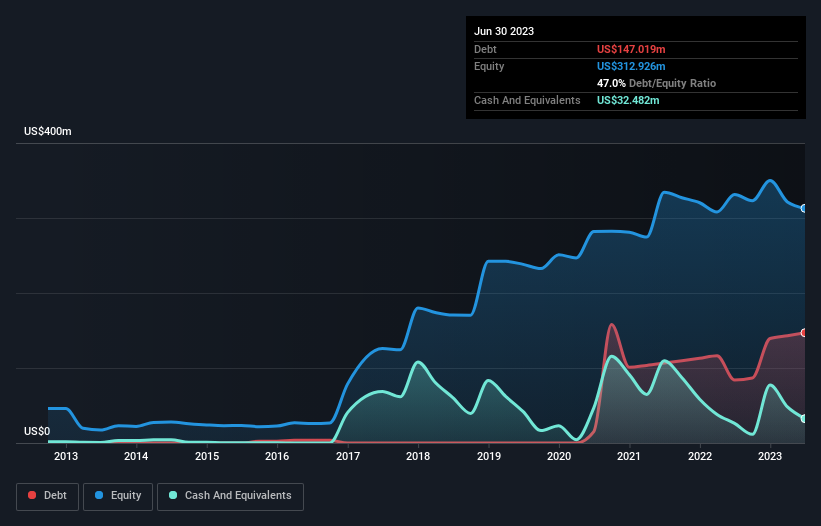The external fund manager backed by Berkshire Hathaway's Charlie Munger, Li Lu, makes no bones about it when he says 'The biggest investment risk is not the volatility of prices, but whether you will suffer a permanent loss of capital.' It's only natural to consider a company's balance sheet when you examine how risky it is, since debt is often involved when a business collapses. We can see that SolGold Plc (LON:SOLG) does use debt in its business. But is this debt a concern to shareholders?
When Is Debt Dangerous?
Debt is a tool to help businesses grow, but if a business is incapable of paying off its lenders, then it exists at their mercy. In the worst case scenario, a company can go bankrupt if it cannot pay its creditors. While that is not too common, we often do see indebted companies permanently diluting shareholders because lenders force them to raise capital at a distressed price. Having said that, the most common situation is where a company manages its debt reasonably well - and to its own advantage. When we examine debt levels, we first consider both cash and debt levels, together.
See our latest analysis for SolGold
How Much Debt Does SolGold Carry?
The image below, which you can click on for greater detail, shows that at June 2023 SolGold had debt of US$147.0m, up from US$84.1m in one year. However, it does have US$32.5m in cash offsetting this, leading to net debt of about US$114.5m.

How Strong Is SolGold's Balance Sheet?
We can see from the most recent balance sheet that SolGold had liabilities of US$13.8m falling due within a year, and liabilities of US$151.6m due beyond that. Offsetting this, it had US$32.5m in cash and US$9.02m in receivables that were due within 12 months. So it has liabilities totalling US$123.9m more than its cash and near-term receivables, combined.
While this might seem like a lot, it is not so bad since SolGold has a market capitalization of US$458.1m, and so it could probably strengthen its balance sheet by raising capital if it needed to. But we definitely want to keep our eyes open to indications that its debt is bringing too much risk. There's no doubt that we learn most about debt from the balance sheet. But ultimately the future profitability of the business will decide if SolGold can strengthen its balance sheet over time. So if you're focused on the future you can check out this free report showing analyst profit forecasts.
Given its lack of meaningful operating revenue, investors are probably hoping that SolGold finds some valuable resources, before it runs out of money.
Caveat Emptor
Importantly, SolGold had an earnings before interest and tax (EBIT) loss over the last year. To be specific the EBIT loss came in at US$38m. Considering that alongside the liabilities mentioned above does not give us much confidence that company should be using so much debt. So we think its balance sheet is a little strained, though not beyond repair. Another cause for caution is that is bled US$79m in negative free cash flow over the last twelve months. So in short it's a really risky stock. There's no doubt that we learn most about debt from the balance sheet. But ultimately, every company can contain risks that exist outside of the balance sheet. For example SolGold has 4 warning signs (and 2 which are concerning) we think you should know about.
When all is said and done, sometimes its easier to focus on companies that don't even need debt. Readers can access a list of growth stocks with zero net debt 100% free, right now.
New: Manage All Your Stock Portfolios in One Place
We've created the ultimate portfolio companion for stock investors, and it's free.
• Connect an unlimited number of Portfolios and see your total in one currency
• Be alerted to new Warning Signs or Risks via email or mobile
• Track the Fair Value of your stocks
Have feedback on this article? Concerned about the content? Get in touch with us directly. Alternatively, email editorial-team (at) simplywallst.com.
This article by Simply Wall St is general in nature. We provide commentary based on historical data and analyst forecasts only using an unbiased methodology and our articles are not intended to be financial advice. It does not constitute a recommendation to buy or sell any stock, and does not take account of your objectives, or your financial situation. We aim to bring you long-term focused analysis driven by fundamental data. Note that our analysis may not factor in the latest price-sensitive company announcements or qualitative material. Simply Wall St has no position in any stocks mentioned.
About LSE:SOLG
SolGold
A mineral exploration and development company, engages in the discovery, definition, and development of copper and gold deposits in Australia, Solomon Islands, Ecuador, Canada, Switzerland, the United States, and Chile.
Slight risk with mediocre balance sheet.
Market Insights
Community Narratives


Recently Updated Narratives

CEO: We are winners in the long term in the AI world

Early mover in a fast growing industry. Likely to experience share price volatility as they scale


Near zero debt, Japan centric focus provides future growth
Popular Narratives


MicroVision will explode future revenue by 380.37% with a vision towards success


The company that turned a verb into a global necessity and basically runs the modern internet, digital ads, smartphones, maps, and AI.



